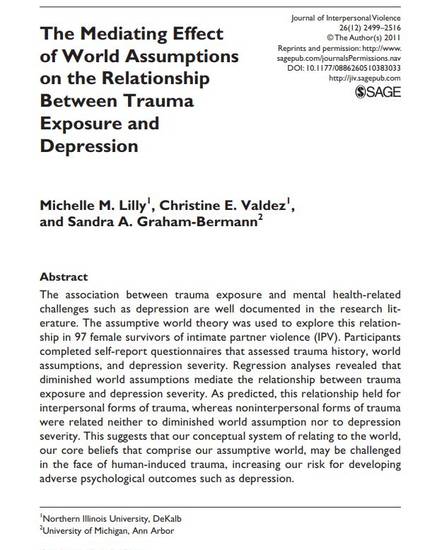
Article
The Mediating Effect of World Assumptions on the Relationship Between Trauma Exposure and Depression
Journal of Interpersonal Violence
(2011)
Abstract
The association between trauma exposure and mental health-related challenges such as depression are well documented in the research literature. The assumptive world theory was used to explore this relationship in 97 female survivors of intimate partner violence (IPV). Participants completed self-report questionnaires that assessed trauma history, world assumptions, and depression severity. Regression analyses revealed that diminished world assumptions mediate the relationship between trauma exposure and depression severity. As predicted, this relationship held for interpersonal forms of trauma, whereas noninterpersonal forms of trauma were related neither to diminished world assumption nor to depression severity. This suggests that our conceptual system of relating to the world, our core beliefs that comprise our assumptive world, may be challenged in the face of human-induced trauma, increasing our risk for developing adverse psychological outcomes such as depression.
Keywords
- interpersonal,
- trauma,
- shattered assumptions,
- depression,
- intimate partner violence
Disciplines
Publication Date
2011
DOI
10.1177/0886260510383033
Citation Information
Michelle M. Lilly, Christine E. Valdez and Sandra A. Graham-Bermann. "The Mediating Effect of World Assumptions on the Relationship Between Trauma Exposure and Depression" Journal of Interpersonal Violence Vol. 26 Iss. 12 (2011) p. 2499 - 2516 Available at: http://works.bepress.com/christine-valdez/16/
